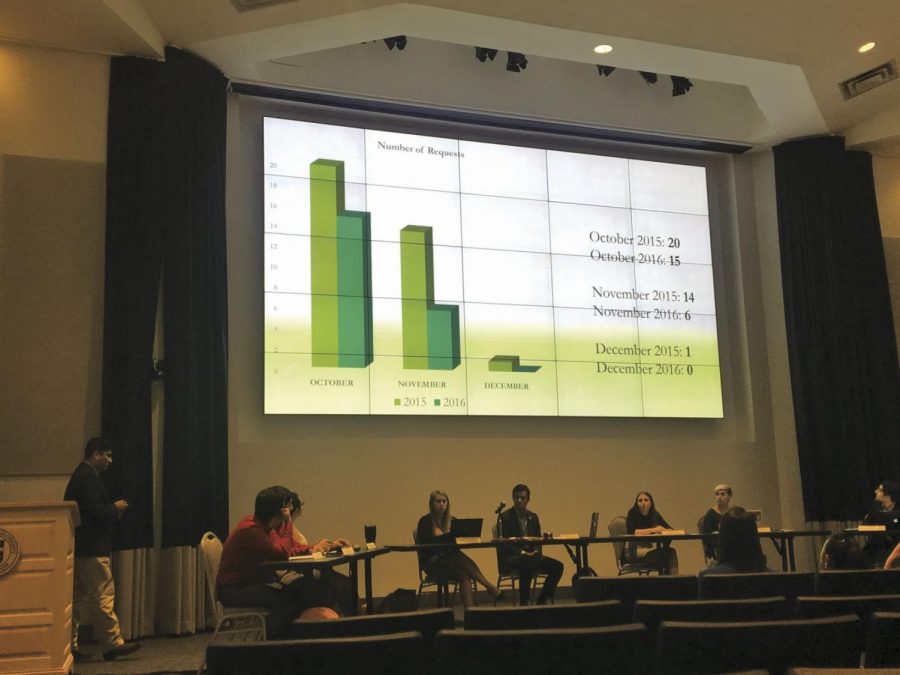Student government may surpass fall budget for funding requests
After the latest formal meeting of the Student Government Association (SGA), 85 percent of the self-imposed $10,000 semester budget has been spent– $1,485 remains.
In previous years, the Recognized Organizations Council (ROC) had the responsibility of allocating funds to on-campus organizations, until the organization was dissolved at the start of this school year. Now, organizations must request funds from the senate.
Student government was allotted $20,000 for the year to be split between semesters. Because SGA has been receiving and distributing requests since June, the initial $10,000 amount for the fall semester has been incrementally parceled out to various organizations.
Requests made over the summer at the start of SGA’s fiscal year in June were more than $1,200.
Since it is not mandatory for senators to attend summer meetings, the funding requests were approved by half of the senate, said Chief Financial Officer Cameron Galvan.
At the start of the meeting Oct. 5, the senate had $2,965 left in their account. After hearing five different funding requests from organizations including Hilltop Student Veterans Association to Math Club, they had $1,485 left in their primary account.
Yet, Galvan assures constituents that this is a completely normal amount at this point of the semester, but what has changed is the amount of money organizations are requesting.
Galvan attributed the increase in amount requested to organizations such as club sports that are now able to make funding requests.
Sen. Carlos Alpuche said that the semester budget may be exhausted before the end of the the Fall semester.
“If anything, I think it is a good thing if we do run out of money because it is showing the administration of the school that organizations are really using this money and they will give us more money for next year,” Alpuche said.
SGA has expanded efforts to update the student body on the new funding changes by broadcasting meetings via Facebook Live. Additionally, each organization is represented by a senator that attends their meetings and helps them fundraise.
“The intention behind this was to make sure it was of the students, so the people who are elected to student government are making these approvals or denials,” Galvan said. “This information is now being made present to everyone.”
Galvan presented charts comparing the amount left in the budget during October, November and December for the past two years. Despite the normalcy of these requests, Galvan said that the Association may have to unprecedentedly dip into spring semester funds if they kept approving requests so rapidly.
“There is no specific policy or rule considering this is the very first time we are doing this,” Galvan said. “If everything is approved for October, November and December, it is going to have to be taken from next semester’s account money.”
In attempts to be more fiscally responsible, the senate reached into their secondary account to meet one of the requests. The Hilltop Veterans Association requested $2,000 to cover some of the costs of their annual Veteran’s Day celebration on Nov. 11.
Following motions to extend deliberation time on the funding request, senators took a five minute recess to discuss in private.
Sen. Sofia Ojeda then proposed a motion to split the request in half — give $1,000 from the primary account and draft legislation to give $1,000 from the secondary account.
The secondary account of $20,000 is filled every decade and is rarely touched. The senate approved Ojeda’s plan and thus retained $1,000 in their primary budget.
Uncertainty in account balances is another obstacle SGA has faced with funding requests.
The representative for Delta Sigma Pi voiced his concerns over his funding request during the meeting.
“Everytime I go into Student Life to check our account they take about 15 minutes and they always tell me either $1,000 above what we actually have or $1,000 below what we actually have,” senior Jared Taylor said. “Student Life is a really unreliable source for our financings.”
Alpuche has been working to clarify that Student Life informs organizations of the correct amount. At the previous formal meeting, the Requirements for Regulations on Student Funding bill, or S.B. 3, was passed by Alpuche and Sen. Miguel Escoto.
The bill requires organizations who are requesting money to fill out a budget form and contact Elizabeth Simmons of Student Life to be informed of the money in their account.
“It could be they do not even need funding from SGA,” Alpuche said.
Regarding student concerns about the budget, Glavan said they were “completely valid” because the budget is “something the senators have to watch out for because there is a limited amount of money.” It is important that the organizations hold senators accountable for their budget, said Galvan.
“Before, with ROC, everything was behind closed doors,” said Galvan. Alpuche and Galvan both agreed that the process has improved since the form of communication between SGA and respective organizations is transparent.







